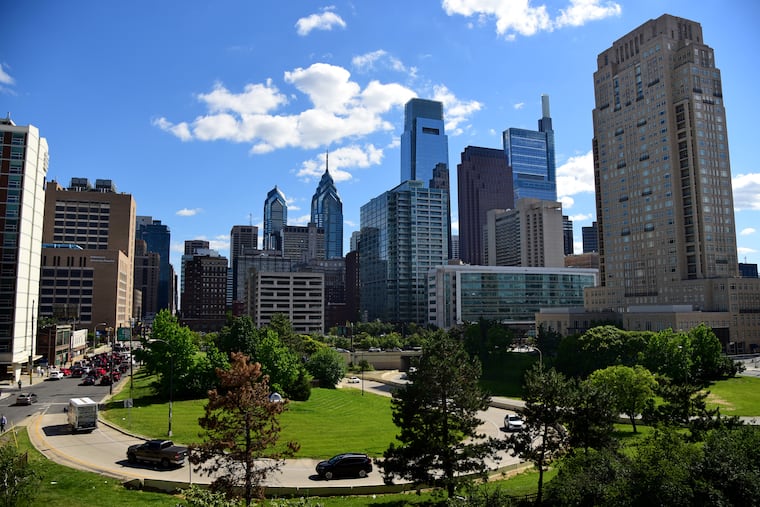Is it ever OK to say you’re from Philly when you grew up in the suburbs? | Opinion
As any Havertown, Croydon or Cherry Hill denizen will tell you, we must never, under any circumstances, let a Philadelphia County resident hear us claiming the city as our hometown.

Last month, I flew from Philadelphia to Cairo. On the third day of my trip, still battling the effects of a nearly 11-hour flight across seven time zones, I ran into another American. We introduced ourselves.
“Where are you from?” Rose asked.
“I’m from Philadelphia,” I said.
Rose’s face brightened. “Me too! Where in Philly?”
And in that moment, I knew I’d made a serious mistake. Because as any Havertown, Croydon, or Cherry Hill denizen will tell you, we must never, under any circumstances, let a Philadelphia County resident hear us claiming the city as our hometown.
As I sheepishly mentioned things like “suburbs” and “309,” Rose interjected.
“So you’re not from Philly, then.”
And listen, I get that this is technically true. But I also felt a little defensive — I can’t claim I’m from Philly, ever? Not even 5,000 miles away? Not even in Egypt?
The thing is, my parents tried really, really hard to make me from Philly. For people who left the city, suburban guilt is real — when it was time for my mom to give birth, my parents drove an hour from our home in Upper Bucks County to a city hospital, mostly so that my birth certificate would say Philadelphia, where they grew up and their families had lived for four generations.
As any Havertown, Croydon or Cherry Hill denizen will tell you, we must never, under any circumstances, let a Philadelphia County resident hear us claiming the city as our hometown.
Growing up, I’ve found that it’s annoying to be from nowhere — a place no one has ever heard of, with no pop culture references to connect with. New Yorkers who hear I’m from suburban Pennsylvania still ask me if I’m from Scranton. Those of us who grew up in the many other cities and towns that surround Philadelphia can’t just sit around waiting for our own version of The Office to get through meaningless small talk — Philly is a convenient shorthand.
Philly people hate when suburban dwellers do it, and there are more of us every year. The city’s population peaked in 1950 and then declined for a generation; by 1990, it had lost half a million residents, while many of its suburbs continued to grow.
But in 2007, the city reported a population increase for the first time in half a century, a trend that has continued since. And as Philly has enjoyed this revival, becoming more friendly and attractive to millennials, kids like me — whose parents are from the city but who grew up in the nearby ‘burbs — are showing up in Fishtown and other 'hoods carrying both feelings of connection to the city and the stories they inherited from their parents about what made them leave Philly for greener pastures.
For my new friend, Rose, though — that doesn’t always feel great.
“Growing up I went to schools in the suburbs, and people would always make fun of me — besides being Egyptian and Muslim — saying, ‘You’re from Killadelphia,’” said Rose, who was born in Philadelphia. “Then these kids go to Temple or even Arcadia, and will be like ‘I’m Philly-made’, saying jawn, saying they’re from Philly — my first question is always, ‘Where?’” Rose said. Those same students, she said, will throw beer bottles outside on weekends, and then complain that the city is dirty.
Suburbanites and recent transplants have a habit of “rediscovering” parts of Philly that have always been alive for lifelong city residents.
When I wrote about Corktown, an old Irish American neighborhood now called Mantua, I interviewed the president of the Mantua Civic Association, De’Wayne Drummond, a lifelong resident whose grandmother moved to the area in the 1940s, when many black people were coming to Philly as refugees from the Jim Crow South. For Drummond, who is raising two kids there with his wife, the neighborhood is not the ghost of communities past, but a thriving, rooted place with hopes for the future.
I asked Rose where in the Northeast she’s from, but she doesn’t want to say for publication, in case people accuse her of not being from Philly — apparently even full-fledged city natives get nervous about their credentials.
To be from somewhere is a tricky thing. Is it where we were born, or where we live? Where we feel at home, or the place listed on our driver’s license? And geography matters, but only partly: it’s also about the lived experiences of a city’s residents — not just the joys, but the pain.
I think home is the place for which you feel responsible, the place you’re willing to fight for. For me, that’s both Philly and Bucks County. I think that’s OK.
Jessica Rohan is a writer in Cairo. @jessica_rohan